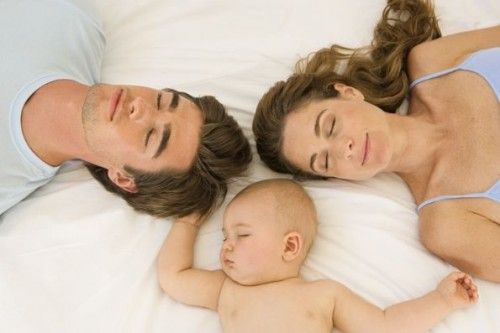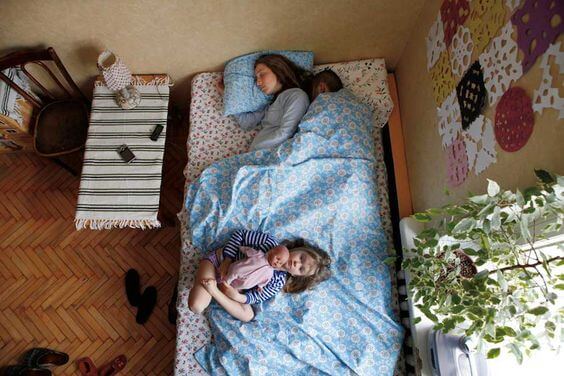Study Finds That Living With Children Is Exhausting for Women But Not for Men

Living with children is a complex task, or at least a tiring one. However, it seems that not everyone undertakes parenting the same way. In particular, according to a recent study, coexisting with children can be exhausting for mothers, but not for fathers.
Apparently the mission of caring for children is not perceived the same way by adults. The impact of living with children varies between men and women. This is understood thanks to research conducted via various telephone surveys.
The study, developed by the American Academy of Neurology in conjunction with the University of South Georgia, interviewed nearly 6,000 people. The conclusion? Having children wreaks havoc on sleep schedules, but this especially affects women.
A Study on Living With Children Generated Controversy
This study consulted both men and women. They were asked how many hours they slept, knowing that 8 hours was ideal and less than 6 hours was insufficient. They also asked how many days they had been tired in the last month.
The data was complemented with basic socio-demographic information: age, income, marital status, body mass index (BMI), exercise habits, work status and number of children. These were also relevant factors.

The latter were considered vectors possibly related to sleep deprivation. However, the result was controversial. The echoes of their answers were those that harshly impact every country around the world.
It’s that, among the adult women who participated in the study, the only factor associated with sleep was the presence of children in the home. In fact, with each little one in the house, the probability of decreased resting time increased by 50%.
A man who does not know how to be a good father is not a true man.
-Mario Puzo, writer
Thus, the research found that living with children is linked to the amount of sleep time available to women. Likewise, it has a strong influence on how often they feel fatigued. The mothers said they felt tired about 15 days each month, a figure that decreased if women did not have children.
On the contrary, they discovered that fathers were not affected by having children. However, according to researchers Tara Haelle and Emily Willingham, the current reality is something different. Mothers sleep more than fathers, since they recover missed sleep time during the day while fathers work.
To Sleep Well or Not to Sleep Well, That Is the Question
Apparently, according to the study, it is not about who sleeps more or less. The question is about quality of sleep. Who sleeps better is therefore the main question to ask. The lack of data referring to the methodology of this controversial study cannot be ignored.
According to a study published by Armando, moms may sleep longer. However, a detail to consider is that they rest in a more fragmented way. Even with a growing interest in paternal commitment, biological reasons are what make the woman more likely to get up at night.

It is precisely this last aspect, the simply biological one, that would make sense in the conclusion of this novel study. It would explain why mothers feel more tired than any woman who sleeps the same amount of hours.
Waking up often is not a good rest at all. When this is repeated several times each night, mothers do not get to enjoy the restful sleep that they need so much. Thus, there is no possibility of feeling rested.
As each home is its own universe and every family is a world, we want to know your opinion. What do you think about this study? Share with us!
Undoubtedly, this study will continue to be brought up for a long time.
Living with children is a complex task, or at least a tiring one. However, it seems that not everyone undertakes parenting the same way. In particular, according to a recent study, coexisting with children can be exhausting for mothers, but not for fathers.
Apparently the mission of caring for children is not perceived the same way by adults. The impact of living with children varies between men and women. This is understood thanks to research conducted via various telephone surveys.
The study, developed by the American Academy of Neurology in conjunction with the University of South Georgia, interviewed nearly 6,000 people. The conclusion? Having children wreaks havoc on sleep schedules, but this especially affects women.
A Study on Living With Children Generated Controversy
This study consulted both men and women. They were asked how many hours they slept, knowing that 8 hours was ideal and less than 6 hours was insufficient. They also asked how many days they had been tired in the last month.
The data was complemented with basic socio-demographic information: age, income, marital status, body mass index (BMI), exercise habits, work status and number of children. These were also relevant factors.

The latter were considered vectors possibly related to sleep deprivation. However, the result was controversial. The echoes of their answers were those that harshly impact every country around the world.
It’s that, among the adult women who participated in the study, the only factor associated with sleep was the presence of children in the home. In fact, with each little one in the house, the probability of decreased resting time increased by 50%.
A man who does not know how to be a good father is not a true man.
-Mario Puzo, writer
Thus, the research found that living with children is linked to the amount of sleep time available to women. Likewise, it has a strong influence on how often they feel fatigued. The mothers said they felt tired about 15 days each month, a figure that decreased if women did not have children.
On the contrary, they discovered that fathers were not affected by having children. However, according to researchers Tara Haelle and Emily Willingham, the current reality is something different. Mothers sleep more than fathers, since they recover missed sleep time during the day while fathers work.
To Sleep Well or Not to Sleep Well, That Is the Question
Apparently, according to the study, it is not about who sleeps more or less. The question is about quality of sleep. Who sleeps better is therefore the main question to ask. The lack of data referring to the methodology of this controversial study cannot be ignored.
According to a study published by Armando, moms may sleep longer. However, a detail to consider is that they rest in a more fragmented way. Even with a growing interest in paternal commitment, biological reasons are what make the woman more likely to get up at night.

It is precisely this last aspect, the simply biological one, that would make sense in the conclusion of this novel study. It would explain why mothers feel more tired than any woman who sleeps the same amount of hours.
Waking up often is not a good rest at all. When this is repeated several times each night, mothers do not get to enjoy the restful sleep that they need so much. Thus, there is no possibility of feeling rested.
As each home is its own universe and every family is a world, we want to know your opinion. What do you think about this study? Share with us!
Undoubtedly, this study will continue to be brought up for a long time.
All cited sources were thoroughly reviewed by our team to ensure their quality, reliability, currency, and validity. The bibliography of this article was considered reliable and of academic or scientific accuracy.
- Sullivan, K. L. (2017). Living with Children May Mean Less Sleep for Women, But Not for Men. https://www.aan.com/PressRoom/Home/PressRelease/1527
This text is provided for informational purposes only and does not replace consultation with a professional. If in doubt, consult your specialist.








